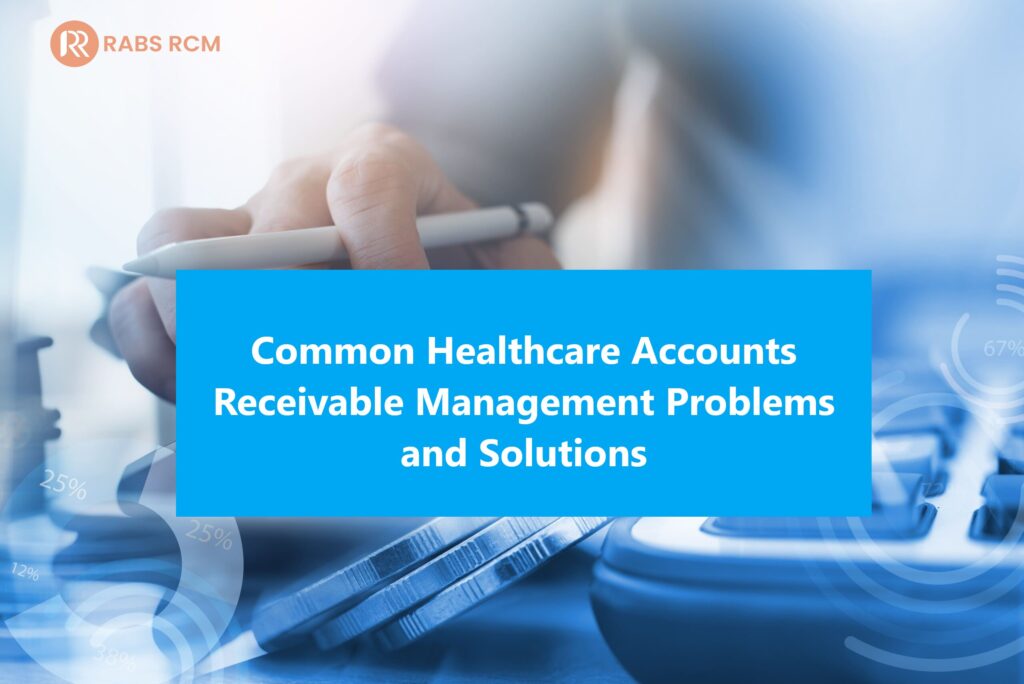Copyright © 2022 Rabs-RCM. All Rights Reserved.

Common Healthcare Accounts Receivable Management Problems and Solutions
In the intricate landscape of healthcare administration, efficient management of accounts receivable (AR) is a crucial pillar supporting financial health. However, numerous challenges often impede seamless AR management, leading to delays, revenue loss, and operational inefficiencies. In this comprehensive guide, we delve into the common healthcare accounts receivable management problems and offer effective solutions to mitigate them.
Understanding the Landscape
Before delving into specific issues and remedies, it’s paramount to grasp the intricate landscape of healthcare AR management. From insurance claims processing to patient billing, healthcare providers navigate a complex network of transactions, regulations, and payer requirements. This complexity often gives rise to myriad challenges, hindering revenue’s smooth flow.
Identifying Common Problems
Denial Management
Denial of insurance claims remains a significant hurdle in revenue cycle management for healthcare providers. Whether due to coding errors, lack of documentation, or eligibility issues, denied claims lead to revenue leakage and increased administrative burden.
Inefficient Billing Processes
Outdated billing processes and systems contribute to delays in revenue realization. Manual data entry, paper-based billing, and disjointed workflows result in billing errors, payment delays, and dissatisfied patients.
Lack of Transparency
A lack of transparency in billing and payment processes breeds mistrust among patients. Unclear billing statements, surprise charges, and inconsistent communication erode patient satisfaction and loyalty.
Compliance Challenges
Navigating the ever-evolving landscape of healthcare regulations poses a significant challenge for providers. Non-compliance with billing regulations, such as HIPAA and CMS guidelines, exposes organizations to penalties and legal risks.
Staff Training and Education
Inadequate training and education of staff on billing procedures and compliance requirements hinder operational efficiency. Staff turnover exacerbates this issue, leading to inconsistencies in AR management practices.
Implementing Effective Solutions
Utilize Technology Solutions
Investing in healthcare revenue cycle management software streamlines billing processes, reduces errors, and enhances claim submission accuracy. Advanced features such as automated claim scrubbing, real-time eligibility verification, and electronic remittance advice (ERA) integration optimize revenue collection.
Embrace Automation
Automation of repetitive tasks, such as claims submission and follow-up, accelerates revenue cycles and minimizes manual errors. Leveraging artificial intelligence (AI) and machine learning algorithms improves claims adjudication accuracy and proactively identifies patterns to prevent denials.
Enhance Patient Communication
Implement transparent and proactive communication strategies to educate patients about their financial responsibilities. Clear, concise billing statements, digital payment options, and price transparency tools empower patients to navigate the billing process confidently.
Prioritize Compliance
Stay abreast of regulatory changes and invest in robust compliance management systems. Conduct regular audits to ensure adherence to billing regulations and implement training programs to educate staff on compliance protocols.
Invest in Staff Development
Provide comprehensive training programs for staff members to enhance their billing and coding proficiency. Continuous education and professional development opportunities foster a culture of accountability and excellence in AR management.
Conclusion
Efficient healthcare accounts receivable management is paramount for sustaining financial viability and ensuring operational efficiency in healthcare organizations. By addressing common challenges through innovative solutions, providers can streamline revenue cycles, enhance patient satisfaction, and mitigate compliance risks.

- Our seamless and streamlined efforts, experience, as well as commitment to our clients, all come together to provide both you and your patients with a remarkable experience to remember.
Contact Us
- 2612 62nd St NW Rochester MN 55901 (USA)
- (507) 262-4566
- info@rabs-rcm.com

